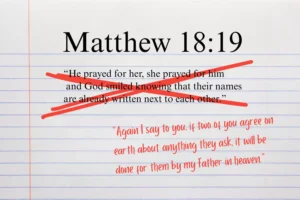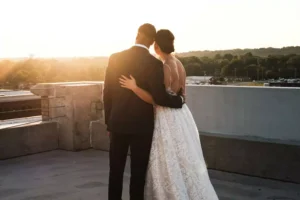“I don’t mean to scare you, but the doctors don’t know what’s going on. I even wonder if I’m going to die.”
These were not the words I wanted to read from my almost-boyfriend.
After nearly two years of careful discernment and open surrender of our unusual friendship before God, we were ready to take the next step forward. I couldn’t believe we had come this far — after all, we only became accidental friends when I left a comment on his blog after being inspired by his journey as an Ironman triathlete and liver transplant survivor.
But God works in mysterious ways, and despite being accountable to several mentors whom I was certain would caution against this friendship, God gave us green light after green light. A mission trip to Cambodia from his home in Canada gave Cliff the opportunity to swing by Singapore to meet me and my community. Soon after, an international missions agency with offices in over 65 countries, who knew nothing about me or his interest in me, posted Cliff to Singapore long-term.
But just before Cliff moved to Singapore for his new role and to pursue a relationship with me, his health crisis happened. His liver markers and blood pressure skyrocketed. He suffered frequent, pounding headaches. Dozens of tests were run, but none of the doctors could explain what was happening. They scheduled a biopsy to investigate the possibility of cancer or liver failure.
“I always wondered when my liver transplant might expire. I’ve had it for over 20 years, so maybe my time is up,” he reasoned.
With tears in my eyes, I grappled with what lay before me. Friends and mentors who had supported our relationship suddenly asked me to think twice. My parents vehemently objected.
“Are you sure you’re ready to be widowed young? You have a bright future ahead of you.” Words like liability, high-risk and unwise were thrown around.
Years ago when I asked God for a life partner, I remember listing a dozen different requirements, one of which was “loves to exercise, like me.” But none of my requirements included the criteria for being healthy. Even as a medical doctor-to-be, I never considered marrying a liver transplant patient.
So, what now? Wouldn’t Cliff and God understand if I dropped the relationship because he was “high-risk”?
Life is risk, and risk is right
In his book “Don’t Waste Your Life,” John Piper defines risk as “an action that exposes one to the possibility of loss or injury.” He shares how risk exists because we don’t know tomorrow.
As humans, it is natural to want to look for a mate with “minimal risk” and high chances of “success,” whatever that means. We are naturally on the lookout for anything that might jeopardize our perception of the “ideal” marriage; we want to set ourselves up with optimal conditions on all fronts: situational, relational, financial, physical. Why settle for anything less, right?
The truth of the matter, however, is that when you date, you are dating a person with a story, struggles and scars — not a perfectly put-together profile of pristine qualities and circumstances. Who among us has no challenges or baggage? Who can accurately predict and promise our partners a blissful, struggle-free life ahead?
In fact, as believers, we are guaranteed hardship. As I wrestled with God, I began to believe what John Piper wrote, that “if our single, all-embracing passion is to make much of Christ in life and death, and if the life that magnifies Him most is the life of costly love, then life is risk and risk is right. To run from it is to waste your life.”
I discovered that the mission of my life was not self-preservation, but to trust and obey God. Still, I pleaded with Him for three good years of marriage, if that was all Cliff’s life could last. Through weeks of tears and travail with God, my faith broke through. I said yes to God and Cliff.
After a dozen more tests and agonizing waits, Cliff’s blood results unexpectedly resolved. With clenched fists, we waited for the biopsy test date and then for the final report; it came back normal. Even today, the doctors cannot explain the bizarre turn of events except to attribute Cliff’s episode to perhaps an unknown virus.
As if the whole trial was a test of faith, I knew God was asking me to release control and live by faith for the rest of my life. There is no guarantee that a liver crisis might not happen again, but I now know I can trust God with each day, one step at a time.
If you’re contemplating whether to date someone because of his or her potential health issues — maybe she has an autoimmune disease, maybe he has a family history of genetic disorders — here are three statements to consider before you decide.
1. You don’t know the future.
Only God knows what’s ahead. And because of this, we must entrust our health and even our very lives into His hands. None of us are guaranteed health, success or a problem-free existence. We don’t know if our hearts will continue beating tomorrow, if we will die in a car crash or contract a deadly disease. The tragic hypocrisy of our faith today is that we are deceived to think that our better judgment might help us preserve a security that does not even exist.
Interestingly, Cliff and I have had to go through more hell-fire in our marriage via my two bouts of severe depression and the eroding effects of a lingering eating disorder than any of Cliff’s liver transplant issues.
Equally interestingly, because I’m now a medical doctor, I can look into his blood results in greater detail and recommend a better titration of his medications. Today, his cyclosporine levels are a sixth of what they were when we met, his medication dosage has been quartered, and Cliff is the healthiest he has been since his Ironman days.
It is dangerous to use earthly metrics to measure divine outcomes. Instead of making decisions based on fear and risk-calculations, should we not instead make decisions based on faith?
2. You should count the cost.
When Cliff shared the news about his condition, I was about to take my final medical exams. On the last afternoon before my clinical examinations started, I desperately tried to prepare by interviewing and examining as many hospital patients as I could. All refused me except one. It was as if God led me to him. The last patient I interviewed in medical school was a kidney transplant patient who was on the same long-term immunosuppressant medication as Cliff and was suffering from lymphoma, a side effect of it.
I went home, completely sobered. A similar image of Cliff lying on a hospital bed with me huddled next to him played over and over in my mind, triggering streams of tears whenever I thought of it.
When faced with Cliff’s condition, I decided I would count the cost before I said yes. Since marriage is a covenant for life, I wanted to be sure I was ready for hard times if they did come.
It’s OK to be honest with yourself. A girl Cliff had pursued before me decided Cliff was not someone she could count the cost with, so with this heartbreaking announcement, their friendship ended. Looking back, it’s probably better she was honest from the start rather than prolonging the inevitable and hurting Cliff deeply. Cliff often tells me how grateful he is now that she said no.
You should never go into a relationship blind, especially one that presents immediate challenges. Some conditions, including those involving severe mental illness such as manic depression or schizophrenia, should always be treated and controlled before a romantic relationship begins.
Yes, God may call you to something difficult. And He will always call you to trust Him. But whatever the circumstance — pray, seek wise counsel, and count the cost.
3. You can count on God.
While we all want a partner to journey with for life, the truth is that none of us are guaranteed that. Even the healthiest spouse is not immune to critical illness or a devastating accident.
In our first year of marriage, I had panic attacks on a weekly basis. I would wake up in the middle of the night in cold sweat and check if Cliff was still breathing.
When we decided to take a year off to pursue missions, our pastor opened the door for us to visit Uganda, a place where the yellow fever vaccine is mandatory, but Cliff was unable to take it because of his transplant. My panic attacks worsened. I was traumatized by a missionary’s comment that I was being “medically irresponsible” to allow Cliff to go to Uganda for missions. I cried out to God for help.
We did a short exploratory trip to Uganda, and I begged the Lord to show me a sign of His grace if Uganda was the place He wanted us to serve. We scheduled time to visit the best hospital in Kampala, but I was disappointed to see there was no hepatologist available. With my heart heavy, I walked out of the hospital but was soon stopped by a tall African man dressed in white.
“You are lost,” he said in typical Ugandan-speak, meaning, “Can I help you?”
“Yes,” I stammered, before sharing with him my husband’s medical condition.
Reaching into his pocket for his card, he shared that he was the hospital’s medical director, and he gave me his personal number. “If you ever need help for investigations or even a medical evacuation, you can call me directly. I am here 24/7.”
At that moment, I felt the Holy Spirit overshadow me. I heard God tell me, “Can you possibly love Cliff more than I love him? Are you willing to entrust him to Me?”
Since then, my panic attacks have stopped. While I used to pray from a posture of fear for God to preserve Cliff’s life, I can now pray from a posture of faith for God to maximize our days on earth, however short or long they might be.
God writes our story
If you’re struggling with whether to pursue a relationship because of someone’s health condition, ask yourself: Anxiety and health risks aside, based on this person’s love for Jesus, calling and character, what would my decision be?
I have been married to my blogging, Ironman completing, liver transplant surviving, Jesus-loving long-distance pursuer for nine years. When we met, we lived 10,000 miles apart. Our wild beginning was captured in a video that quickly went viral. The rest of our story is still being written.
We might not know tomorrow, but God does. And because He does, we can trust the choices we make in line with His Word, no matter what the future might bring.
Copyright Wai Jia Tam 2022. All Rights Reserved.











